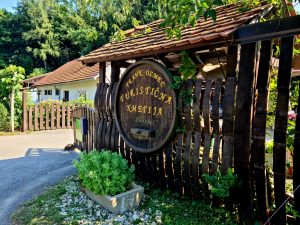I was baptised into the Catholic Church. And for the large part of my adult life (when I got to choose whether or not to go to mass) I’ve been a regular Sunday mass-goer with the occasional mid-week celebration thrown in for good measure. I had a couple of years where I didn’t go. I was living in Alaska at the time, so perhaps it was a combination of simply not bothering and not having a regular priest that put paid to my religious attendance – I can’t remember.
I like going. But I prefer going to mass in a language other than English, as that way I can’t understand the sermon and I don’t get upset at a priest wasting 10 minutes of golden speaking time on a captive audience by not making his sermon relevant to twenty-first-century living. A few years back, for one liturgical year, I posted and recorded my own 3-minute sermons – sermons I’d have given on the day, had I been a priest, something that’s not likely to happen in my lifetime.
On being Catholic
I’ve taken schtick over the years for being Catholic, for being party to a religion that has been damned over and over for turning a blind eye to abuse, for aiding and abetting Nazis in the aftermath of WWII, for atrocities in Franco’s Spain (CJ Sansom’s Winter in Madrid, albeit a novel, was eye-opening). The list seems endless at times. Let us not forget that the Roman Catholic Church, like most religions, is a man-made institution and subject to human faults and failings – not an excuse just something to bear in mind. My relationship is with my God, rather than with my church. My church and I differ on a number of issues, as do my friends and I, too. My religion is my faith. That it bears the Catholic brand is something that doesn’t put in on me one way or another.
Without weighting the various atrocities and scandals associated with the Catholic Church in order of perceived atrociousness or level of scandal, one that has bothered me consistently over the years is the part the Vatican played in the Ratlines and Pope Pius XII’s associations with Hitler. John Cornwell’s article in Vanity Fair back in 2013 left me reeling. Perhaps this is why I’m always inordinately pleased to discover someone of church ranking back then who did some good, who stood up and lived their faith.

God has no country
In Killarney recently, I happened across a man I’d never heard of. Monsignor Hugh O’Flaherty, a Kerry man, aka The Vatican Pimpernel or The Scarlet Pimpernel of the Vatican, a man immortalised by Gregory Peck in the movie, The Scarlet and the Black. His was a fascinating life. His life is also immortalised by actor/director/playwright Donal Courtney (uncle of the talented actor/musician/songwriter Jess Leen – one to watch) in his play God has no country. [This is on my must-watch list for Irish theatre – has anyone seen it?]
Stationed in Rome, back in the early 1940s, the Monsignor toured POW camps in Italy tracking down those reported as missing in action. Using Radio Vatican, he’d then try to let their families know that they were still alive. He became a familiar figure. When those who had been released in 1943 post-Mussolini were in danger of being recaptured now that the Germans were at the helm, they reached out to him. [Did you know that the Irish Embassy to the Holy See was the only English-speaking embassy to stay open in Rome during WWII? I didn’t. ] His band of merry men (and women) included other priests, agents of Free France, communists, and some nobility. Together, they hid thousands of Allied soldiers and Jews in hideouts around the country. The Monsignor would travel outside the Vatican in disguise but when the Germans finally figured out who he was, he had to stay within the Vatican to avoid arrest.
The local head of the Gestapo and the SS in Rome apparently drew a white line on the ground marking the point where the Vatican ended and Italy began, a line the Monsignor should not cross. When he was caught and imprisoned after the War, Obersturmbannführer Herbert Kappler had one regular visitor – O’Flaherty. The visits had an effect, as in1959, he converted to Catholicism, baptised by the Monsignor.
When Rome was liberated, the Monsignor and his helpers had soldiers and Jews from some 25 countries under their protection, evidence of his belief that God has no country.

The Hugh O’Flaherty Memorial
A memorial to the great man was unveiled on 30 October 2013 in Killarney in the hope that
[…]this and future generations will be inspired by Hugh O’Flaherty’s incredible deeds and example and will in turn play their own part in making our world a better place.
Slowly but surely word of his daring is leaking out as hordes of visitors stop and read and take photos to tweet and blog and share at with a greater audience. Just like I’m doing. Not for the first time, I’m grateful to have had the opportunity to be a tourist in my home country and grateful, too, that I’m still discovering the joy that is Ireland.

Save
Save
Save
Share this:
- Click to share on X (Opens in new window) X
- Click to share on Facebook (Opens in new window) Facebook
- Click to share on Pinterest (Opens in new window) Pinterest
- Click to share on LinkedIn (Opens in new window) LinkedIn
- Click to share on Reddit (Opens in new window) Reddit
- Click to share on WhatsApp (Opens in new window) WhatsApp
- Click to share on Pocket (Opens in new window) Pocket
- Click to share on Telegram (Opens in new window) Telegram
- Click to email a link to a friend (Opens in new window) Email






